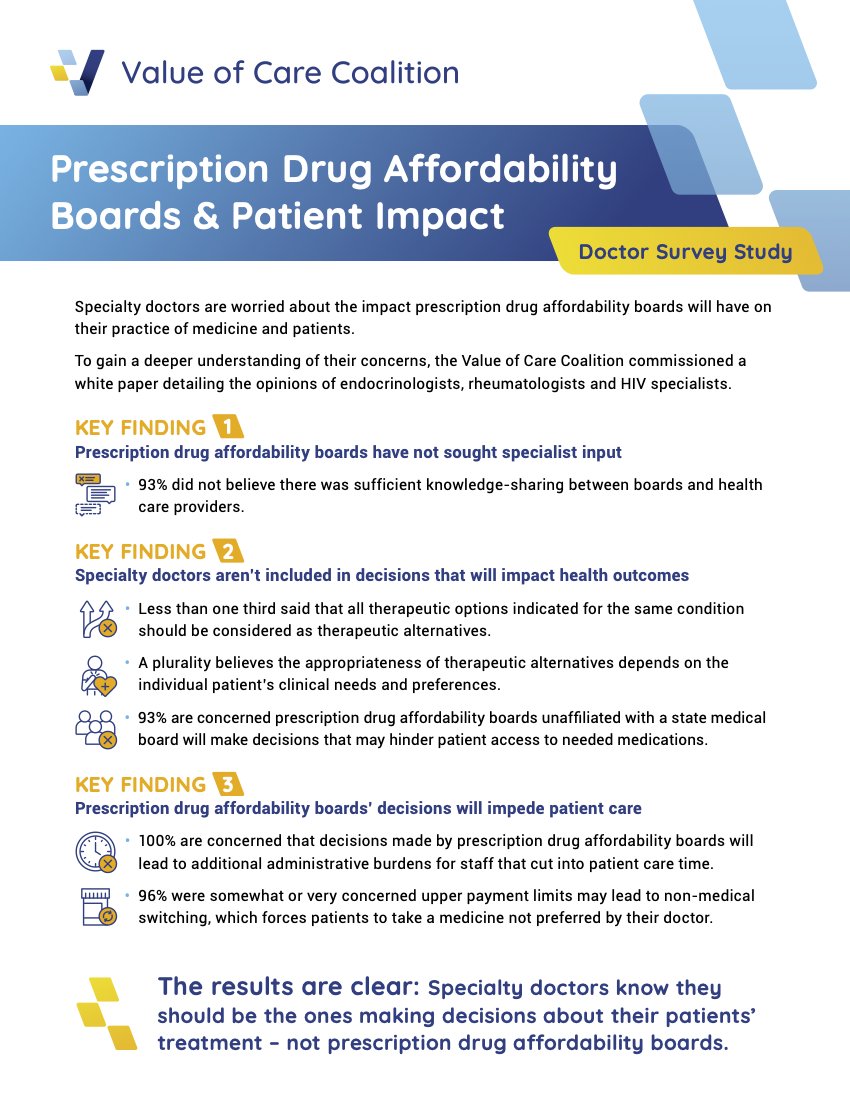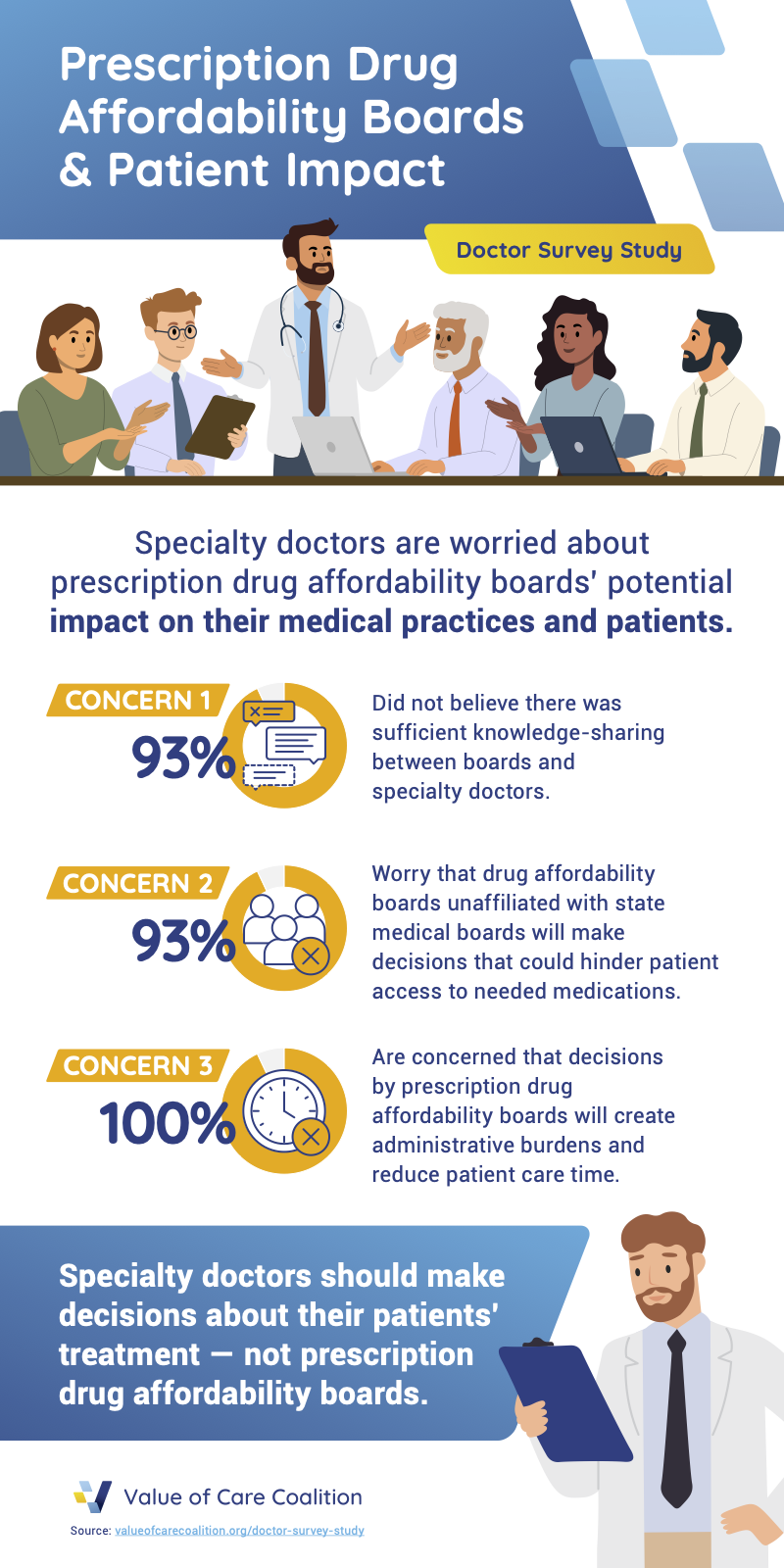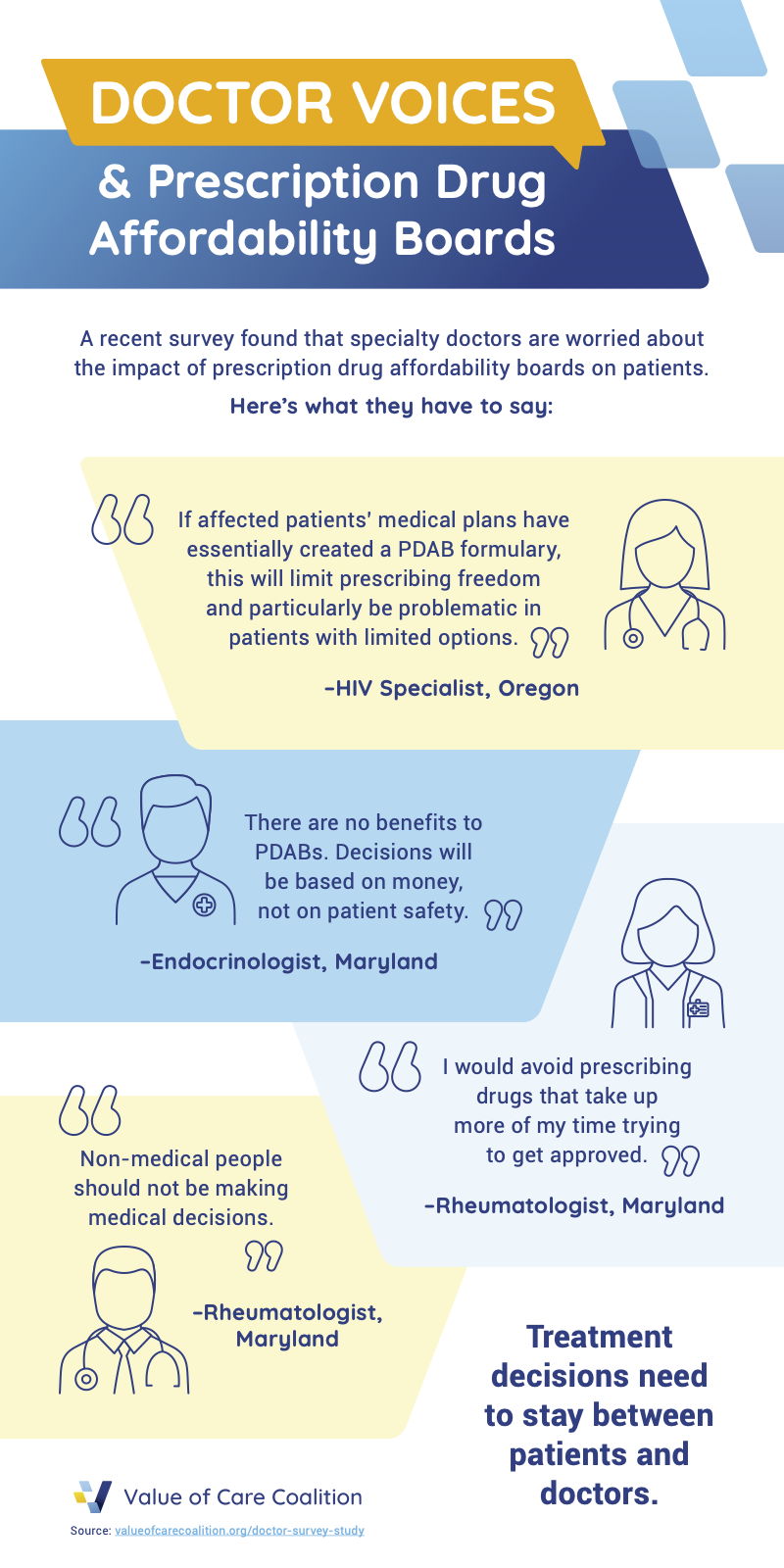We Found Out.
State Prescription Drug Affordability Boards (PDABs) and Analysis of Patient Impact: A US Physician Survey Study
Prescription drug affordability boards are currently conducting affordability reviews or setting upper payment limits in four states. They take public comments each month, but what have they done to ask the specialists who prescribe these treatments how board decisions will affect their patients? Pharmacists are warning they won’t be able to stock impacted medications. Health plans are warning of rising patient costs and increased delays and denials. What about doctors?
The Value of Care Coalition commissioned a white paper, authored by Magnolia Market Access, that seeks input from specialty doctors on how they interact with PDABs and what they think the impact of upper payment limits will be on their patients and their practice of medicine.
EXECUTIVE SUMMARY
Endocrinologists, rheumatologists, and human immunodeficiency virus (HIV) specialists/infectious disease specialists from Colorado, Maryland, Oregon, and Washington participated in an online survey to capture insights on Prescription Drug Affordability Boards’ (PDABs) impact on patient accessibility and affordability of treatments.
– Almost universally, physicians (93%) report a lack of sufficient knowledge-sharing between PDABs and clinicians
– Physicians (93%) are also concerned PDABs unaffiliated with a state medical board will make decisions that may affect medication access
– Clinicians surveyed (96%) were somewhat or very concerned that UPLs may lead to non-medical switching
– All specialists surveyed (100%) are concerned that additional administrative burdens related to PDABs will cut into office staff time and patient care
– “There are no benefits to PDABs. Decisions will be based on money, not on patient safety.” –Maryland Endocrinologist
Doctors in their own words.
Practicing health care providers in states with prescription drug affordability boards reviewed the paper’s findings. Here’s what they had to say.
Dr. Rachel Schreiber, a practicing allergist and immunologist in Rockville, MD, said, “The results are clear. Doctors treating patients with complex conditions are worried about their patients losing access to the treatments they need. While the Board is focused solely on top-line price, doctors are focused on our patients and the quality of their care, too.”
Leyla Henderson, Co-Founder and President of Active Infusions, in Laurel, MD, said, “This government board doesn’t know our patients, their conditions or what treatments they need. Yet they’re setting policies that could determine access to those treatments. Health care decisions should be made by doctors, but doctors are being left out of the discussion.”
Dr. Amish Dave, a practicing rheumatologist in Seattle, WA, said, “Rheumatologists are constantly advocating for their patients’ access to essential medications that control their autoimmune diseases. Far too often patients are switched between medications for non-clinical reasons based on PBM incentives for higher rebates. Upper payment limits proposed by a PDAB will only exacerbate that non-medical switching, with people other than the patient’s doctor making determinations that impact patient care. Switching patients from effective, stabilizing medications for non-clinical reasons endangers the patient’s health and threatens potential disease progression.”
Dr. Kevin Miller, a practicing clinician specializing in diabetes and obesity care in Bend, OR, said, “I see patients every day who are benefiting from the very treatments the Oregon prescription drug affordability board is reviewing. I make treatment decisions based on each patient’s individual needs. I’m worried that boards like this make one-size-fits-all decisions that can’t take into account individual patient health.”
Dr. Kari Uusinarkaus, a practicing physician in Colorado Springs, CO, said, “Doctors need the autonomy to prescribe the medicine that works for each individual patient. When a government board makes decisions that are going to impact insurance coverage, it interferes with our ability to offer the best care possible.”
Dr. Liudmila Kastsianok, a practicing rheumatologist in Aurora, CO, said, “Colorado’s Prescription Drug Affordability Board is considering health care policies that undermine doctors’ experience and expertise, and interferes with the doctor-patient relationship. It is clear doctors are worried about the impact of upper payment limits on their patients’ access to the medicines they need. Unfortunately, it’s also clear doctors feel that we aren’t being asked.”
Advocacy Resources
Fact Sheet
The white paper is full of important findings related to specialist doctors’ perceptions of prescription drug affordability boards, their operations, and the impact of upper payment limits. For the highlights, view the Fact Sheet.
Infographics
Specialty doctors are worried about prescription drug affordability boards’ potential impact on their medical practices and patients. This infographic explains why.
Doctor Voices: This infographic displays real verbatim responses from the anonymous survey that illustrate specialty doctors’ concerns about prescription drug affordability boards.




